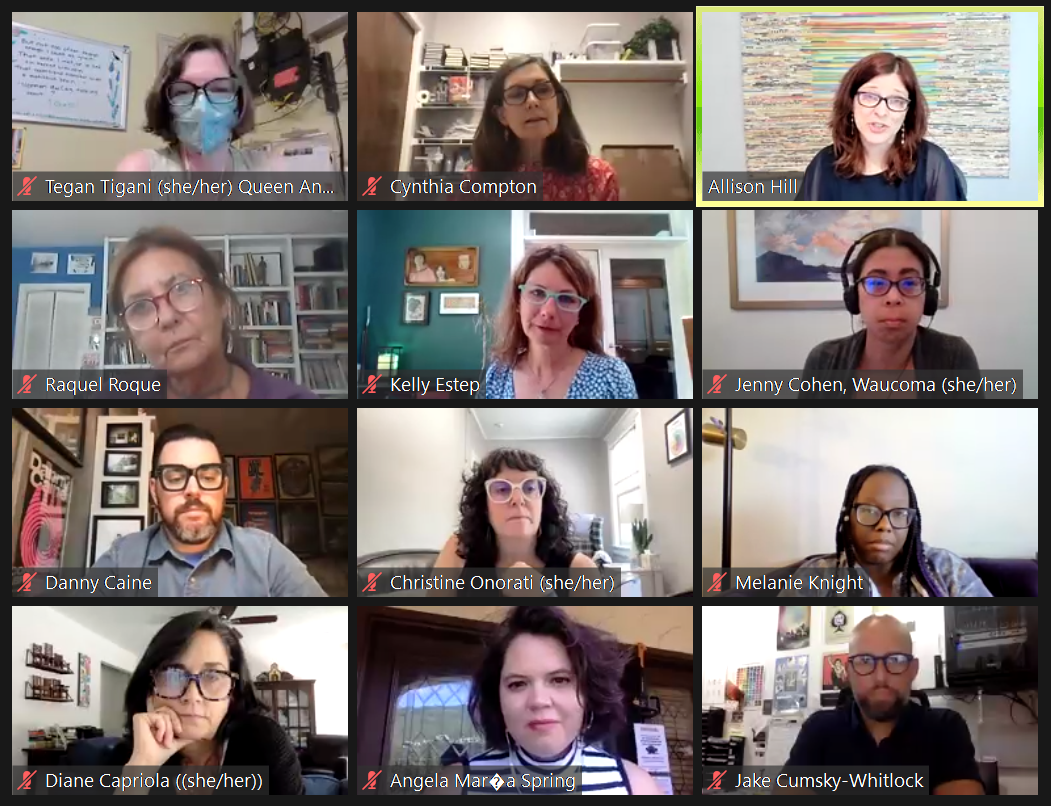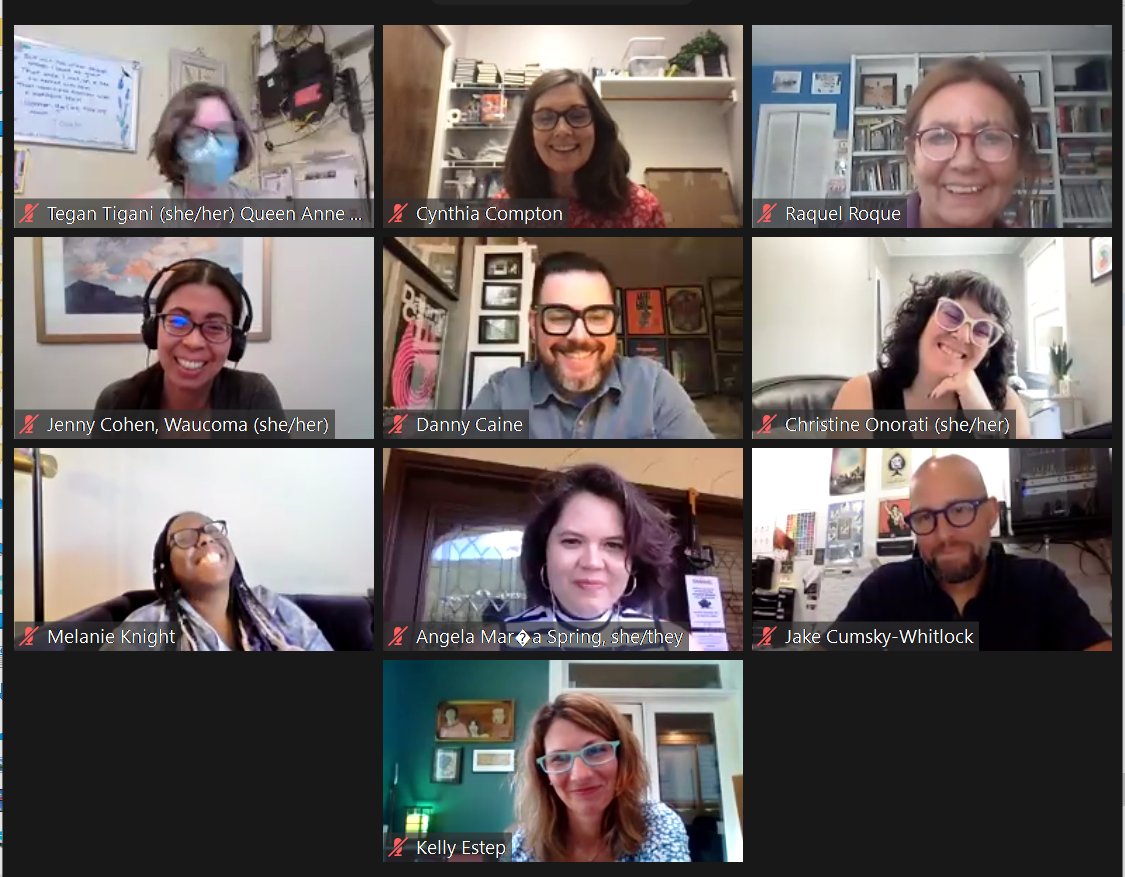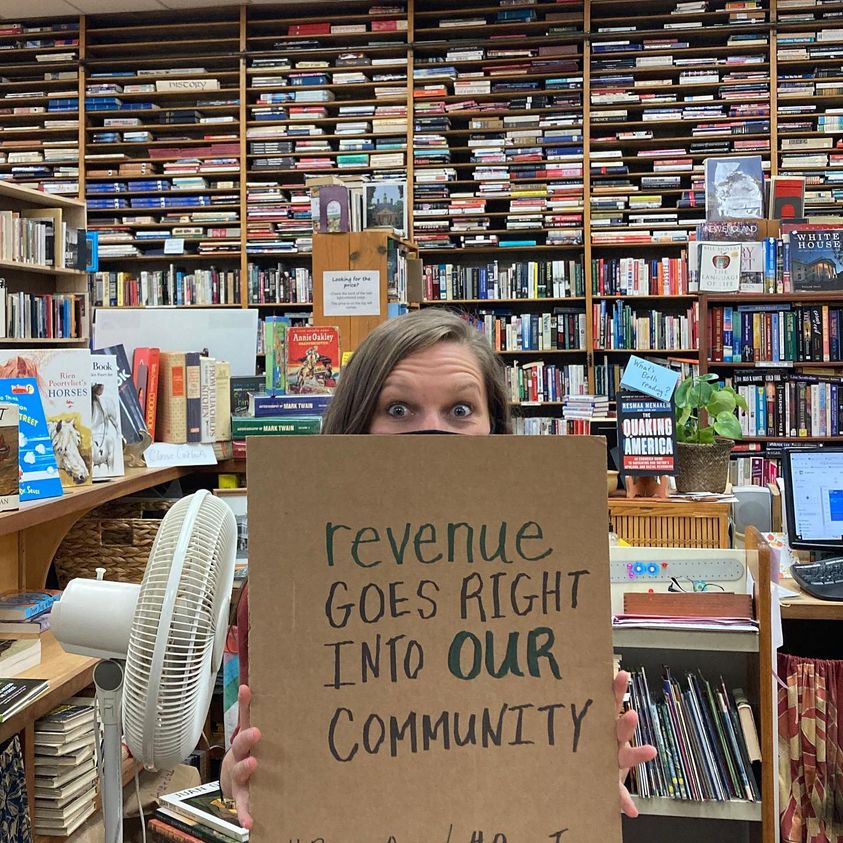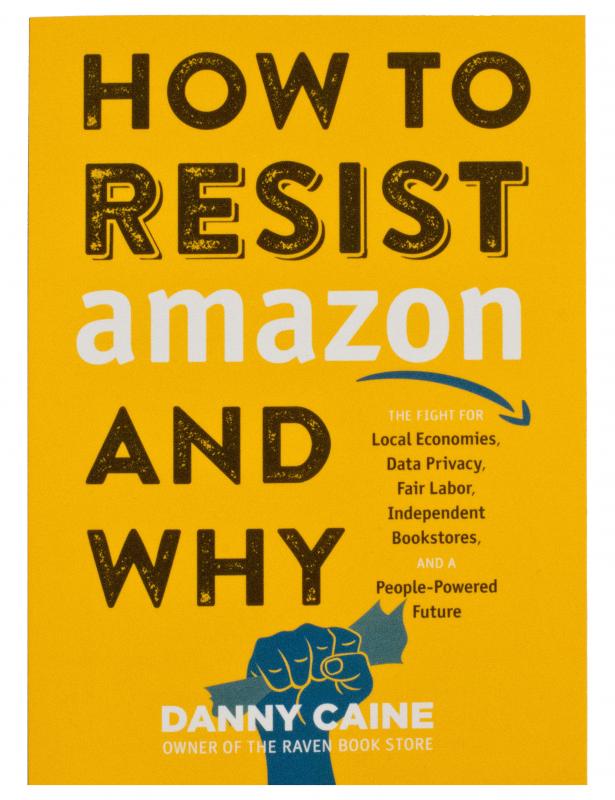ABA Annual Meeting: Challenges, Accomplishments, Goals

With more than 250 attendees Zooming in, the American Booksellers Association annual meeting held yesterday highlighted the sometimes contradictory trends of the past year as well as the association's accomplishments and goals for the future. While more stores have opened and revenues at many established stores rose substantially, costs have been high in a variety of ways. Still, faced with continuing and often unforeseeable challenges, booksellers have responded creatively and are persevering--and positioned well for whatever new surprises may lurk on the horizon.
 |
|
| ABA Board members and CEO Allison Hill at yesterday's meeting. | |
CEO Allison Hill best summed it up, when she said to booksellers at the conclusion of her report, "The work you all do is important in the world and in your communities. It is our honor to support you in it. I know how difficult this year was for many of you. Although most of our stores have reported an increase in sales, we know that that has come with increased costs and increased uncertainty. Year Two of the pandemic proved harder than Year One in many ways, in part because, as several of you said to me at the spring regional shows, it's hard to keep going back to a well that's dry. Many of you have told us you feel depleted. I know the news the past few months may have added weight to your already heavy shoulders, and I'd like to tell you that it's going to get easier, but we're not quite there yet. It will get easier though. And the good news is that the disruption you have experienced has revealed your core of creativity, resilience, and commitment, and generated innovation and insight, all of which have positioned this industry for a brighter future."
Hill also enumerated the association's priorities, which were the same last year and have continued:
Combatting book banning: She quoted ABFE director Dave Grogan as saying ABFE "has never been busier than it's been in the past year." ABFE's work includes providing stores resources "to help educate customers about banned books, letters to use to address school and library challenges," as well as an upcoming "5 Things You Can Do Right Now to Help."
Supporting antitrust legislation: Hill described the association's work in this area as "laser-focused," and emphasized that the ABA launched an advocacy campaign "to ask Congress to bring the American Innovation and Choice Online Act to the floor for a vote. This legislation will create clear rules for fair competition online by banning monopolistic behavior and protecting small businesses and consumers."
Supporting DEI: Hill called this "an ethical issue as well as a business imperative." Among other moves in this area, the ABA "added the Advance Access program for Underrepresented Voices. We hired a DEIA membership manager. We hired a copy editor with a DEI perspective." And, she noted, "as the ABA staff became more diverse this past year, we became better positioned to support our diverse membership and benefited from more diverse perspectives."
Improving e-commerce, which will take a big step forward with introduction soon of IndieCommerce 2.0, with more information available next week. Hill described the new platform as "faster, ADA-compliant, and [having] a more modern checkout and a cleaner look," making it "much easier for stores to handle content and navigate the back end."
Education: Calling education "one of the most valuable resources we offer," she noted that the association hosted "close to 200 education sessions, webinars, and meetups last year. We have a new director of education. We have new plans for the future." And the ABA is already planning the 2023 Winter Institute in Seattle.
Hill also made a plea for better data. "If we're ever going to effectively address critical issues in the industry like livable wage for both booksellers and bookstore owners, health benefits for all, and sustainability, we need data." Two concrete suggestions: stores should report book sales to the ABA and they should report financial information for ABACUS.
Hill was one of several speakers who praised the work of the ABA staff, saying, "Their commitment to your stores and their passion for this industry have been unwavering during a year that was challenging professionally and personally for all of us. They have my respect and gratitude."
ABA president Christine Onorati, owner of WORD Bookstores in Brooklyn, N.Y., and Jersey City, N.J., emphasized that planning and staging in-person events "has always been daunting, to say the least, and the ABA staff always rises to the challenge." But putting on the recent Children's Institute "required a new level of flexibility that we have not experienced before." Still, the staff "pulled it off with unparalleled professionalism." She thanked "each ABA staffer" and Hill. ("We are so lucky to have her steering our ship.")
She also praised her colleagues on the board, saying, "I am so unbelievably proud of this current board and the resilience every single member shows on a daily basis. Running our own businesses seems to get harder every single day, and yet we are all committed to continuing the momentum for change that has begun and [to show that] being guided by values and striving for success in business are not mutually exclusive concepts."
As noted by co-vice-president and secretary Kelly Estep, co-owner of Carmichael's Bookstore and Carmichael's Kids, Louisville, Ky., ABA membership showed healthy gains: as of July 1, 2,023 bookstore companies are members, up 6% from the last annual meeting, representing 2,561 locations, and there are 207 provisional members. In 2021, 215 member stores opened and 41 closed. Since the beginning of the year, 85 stores have opened.
Estep noted, too, that the association has an annual budget of $7 million and employs 39 people. The ABA's investment portfolio amounts to $27.5 million, and investment income supports ABA since membership dues and revenue from various activities don't cover all expenses.
She added that the association has a long-term investment approach that will help it ride out the current stock market downturn. Also the board has adopted (ESG) environmental, social and governance criteria to its investment approach, which has resulted in some changes, including divesting, for example, from Facebook last year. --John Mutter






SHELFAWARENESS.0213.S4.DIFFICULTTOPICSWEBINAR.gif)







SHELFAWARENESS.0213.T3.DIFFICULTTOPICSWEBINAR.gif)

 After purchasing Books Unlimited's inventory, DeWandeler closed the store for two months and made extensive renovations to the space in the fifth-generation-owned, 19th-century building. Her Georgia Road location, also called A Novel Escape, has been closed so she can concentrate on the Main Street store.
After purchasing Books Unlimited's inventory, DeWandeler closed the store for two months and made extensive renovations to the space in the fifth-generation-owned, 19th-century building. Her Georgia Road location, also called A Novel Escape, has been closed so she can concentrate on the Main Street store. 

 "What could be better than
"What could be better than  The Lost Women of Azalea Court
The Lost Women of Azalea Court
 Book you're an evangelist for:
Book you're an evangelist for:  Shortly after her 77-year-old father hanged himself from a bridge near his home in St. Paul, Minn., Juliet Patterson embarked on a quest to unearth the source and meaning of that event, as well as the deaths of both of her grandfathers, also by their own hand. The result is Sinkhole: A Legacy of Suicide, a spare, sensitive evocation of Patterson's experience of grief, paired with an insightful work of family and regional history.
Shortly after her 77-year-old father hanged himself from a bridge near his home in St. Paul, Minn., Juliet Patterson embarked on a quest to unearth the source and meaning of that event, as well as the deaths of both of her grandfathers, also by their own hand. The result is Sinkhole: A Legacy of Suicide, a spare, sensitive evocation of Patterson's experience of grief, paired with an insightful work of family and regional history.
 This week, in the middle of the dismal summer online retail blitz that is Amazon Prime Day(s), Twitter wags were out in force ("My heart goes out to those who couldn't spend Amazon Prime Day with their family or loved ones." And: "Sad that Amazon Prime Day has become all about buying stuff."). But it's no laughing matter for independent bookstores, and booksellers made sure their #AntiPrimeDay message was heard this week on social media. Among the highlights:
This week, in the middle of the dismal summer online retail blitz that is Amazon Prime Day(s), Twitter wags were out in force ("My heart goes out to those who couldn't spend Amazon Prime Day with their family or loved ones." And: "Sad that Amazon Prime Day has become all about buying stuff."). But it's no laughing matter for independent bookstores, and booksellers made sure their #AntiPrimeDay message was heard this week on social media. Among the highlights: 
 Raven Book Store
Raven Book Store
